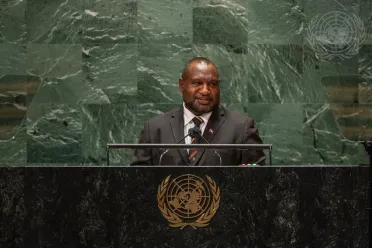Statement
Statement summary
JAMES MARAPE, Prime Minister of Papua New Guinea, pointed out that small island States are being exposed to the global threats of sea-level rise due to climate change. “It is time the big carbon emitters of planet earth own up and apologize to the small island States and all other victims of climate change,” he stated, adding that people are living in fear and uncertainty about the future. “Enough of talk. We have to take actions commensurate to the volume of emissions from our industries,” he said, calling on the big-emitter nations to lead the global effort towards environmental equilibrium. Papua New Guinea, home to 13 per cent of the world’s rainforests, wants to preserve this “great carbon sink”. The carbon removal capacity from the forests is over 100 million tons per year with energy emissions around 10 million annually, he explained. If the Reducing Emissions from Deforestation and Forest Degradation (REDD+) mechanism delivers as it should, his country can remain where every country needs to be by 2050 under the Paris Agreement — a net remover of carbon from the atmosphere. The international community must commit to the energy targets, deal with land use, advocate for the preservation of biodiversity and be bolder in climate financing commitments.
As a natural gas and oil exporter, Papua New Guinea is working to minimize its carbon footprint, implementing Sustainable Development Goal 13, he said. It was one of the first countries to submit the nationally determined contributions in 2020 outlining the goal to be carbon neutral by 2050. However, despite multiple project submissions for climate financing, his country has had limited or no success in accessing these funds, except for technical assistance in developing the fiduciary framework. “We need to see a more practical demonstration of genuine commitments,” he stated. Furthermore, he called on the Member States to finalize robust and fair carbon markets under the Paris Rulebook, to unlock new financing streams that better account for the sustainable development interests of countries like Papua New Guinea.
Turning to COVID-19, he said that while the number of both confirmed cases and fatalities in Papua New Guinea is low, so are vaccination rates. Enactment of the National Pandemic Act 2020, coupled with support from development partners like Australia, New Zealand, United States, Japan, China, European Union, United Kingdom and the United Arab Emirates, enabled his country to immediately access essential medical equipment and vaccines, he said, encouraging strengthening of cooperative global efforts to allow access to COVID-19 vaccines in countries where they are most needed.
His Government aims to achieve a fine balance between meeting all COVID-19 requirements and ensuring an open, functioning economy, he said, highlighting a focus on substantive investment in and development of quality economic infrastructure to link the country’s provinces and enhance their socioeconomic opportunities. While the petroleum, energy and mining sectors contribute some 60 per cent of GDP, his Administration has prioritized investment in the agriculture sector as an “engine of prosperity”. He highlighted the importance of transitioning away from fossil fuels to renewable sources such as hydro, solar, wind and geothermal energy. With a maritime zone spanning over 2.4 million square kilometres, implementing the Ocean Action Agenda is of utmost importance for his country, he said, calling on countries in the region to abstain from unregulated, unreported and illegal fishing.
Turning to the Bougainville peace process, he underlined the United Nations fundamental role in supporting sustainable development and peacebuilding. Constructive dialogue, mutual understanding and partnership are crucial for a lasting political settlement of the Autonomous Region of Bougainville. Human rights and cultural dignities must always be maintained. His Government has prioritized gender equality and empowerment opportunities and is setting quotas for women’s representation in Parliament. Concluding, he called on the General Assembly to do better in delivering on Security Council reform. A consolidated document is needed now for real negotiations to pave the way in that regard.
Full statement
Read the full statement, in PDF format.
Photo

Previous sessions
Access the statements from previous sessions.
